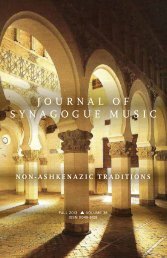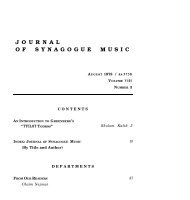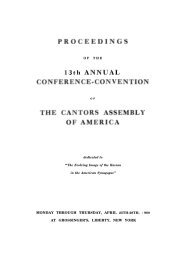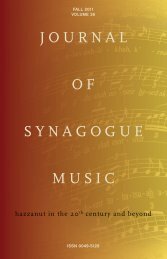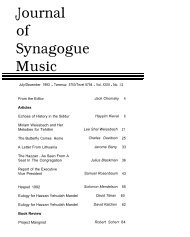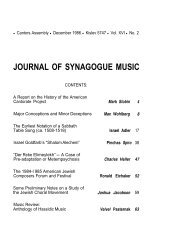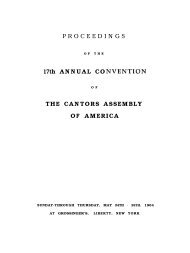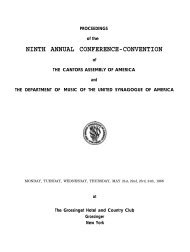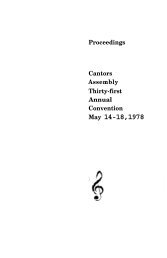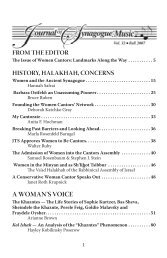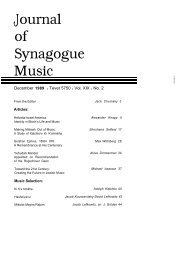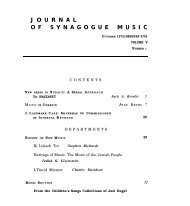Volume 7, Number 3 - Cantors Assembly
Volume 7, Number 3 - Cantors Assembly
Volume 7, Number 3 - Cantors Assembly
Create successful ePaper yourself
Turn your PDF publications into a flip-book with our unique Google optimized e-Paper software.
as it is to bless Him for the good.” It is easy to believe in God when<br />
things go well, but the test of real faith is what happens when we are<br />
faced with disappointment, failure, and tragedy. The Talmud says that<br />
there is a profound difference between an idolater and a believer in<br />
God. To the idolater, if the idol grants him his wishes, he feeds him and<br />
worships him. If he does not fulfill his requests, he smashes the idol into<br />
a million pieces. But the true person of faith maintains his faith even<br />
when faced with the greatest catastrophe.<br />
This is why we say kaddish when we are bereaved even though<br />
there is no mention of death in the prayer. It is a prayer of religious affirmation<br />
said at precisely the time when it is most difficult to do so.<br />
When we lose a loved one, we cry “Why did this happen to me?” And<br />
we want to reject God, religion, and faith. Yet our tradition says: Rise<br />
together with the congregation and say: Yitgadal v ‘yitkadush sh 'mey<br />
rabbah: “Magnified and sanctified in His great name!” In every life<br />
there are joys and sadness, lights and shadows. Someone once said:<br />
“We should not pray to God: “God, please never leave me suffer!”<br />
Everybody who lives, suffers, everybody has his share of tzoros. What<br />
we should pray is: “Dear God, give me the strength to face whatever<br />
life brings my way.”<br />
Finally, the rabbis encourage another hind of prayer: Bana bayit<br />
hadash v’kanah kaylim hadashim omeyr barukh sheheheyanu: If a person<br />
builds a new house, or buys new utensils, or new clothes, he should<br />
say sheheheyanu, he should give thanks to God. Other authorities<br />
have added other occasions for saying sheheheyanu, for example, on<br />
the holy days, or in the performance of any mitzvah which is<br />
associated with happiness.<br />
Our tradition encourages us to give thanks for our many blessings.<br />
On Rosh Hashanah, we should give thanks for our husbands and<br />
wives, our parents, and our children. On Mother’s Day we say a<br />
sheheheyanu for mothers, but why not every day of the year? Fathers<br />
are nice to have around, too, and we should give thanks for them every<br />
day as well. And though our children may cause us headaches and<br />
heartaches, life would really be very dull without them and would lose<br />
so much of its meaning, so we should thank God every day for our<br />
children.<br />
41



